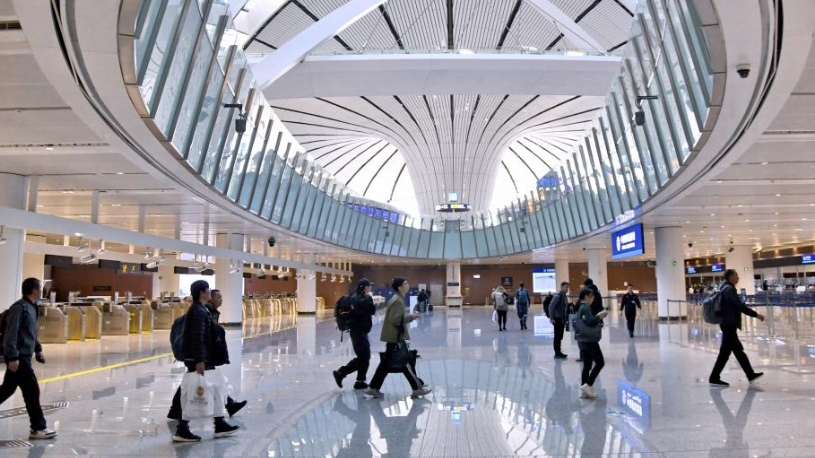BEIJING, Dec. 31 (Xinhua) -- Supported by a series of policy measures to address the yearslong slump, China's property market has shown signs of stabilization and uptick, with renewed confidence and rising demand observed in its most dynamic regional real estate markets.
From easing restrictive policies to introducing stimulus measures, China's 2024 real estate policy package, whether at the country or local level, has been rolled out in droves. Adjustments have been made across areas, including mortgage rates, transaction taxes, down payment ratios, and both supply and demand sides.
In late September, a key meeting convened by the Political Bureau of the Communist Party of China Central Committee emphasized the need to stabilize the property market and reverse its downturn.
Industry insiders view this meeting as a critical turning point for the real estate sector, signaling a shift in policy direction. After a year marked by one of the highest numbers of stimulating policies in history, they believe China's real estate industry is now experiencing its most relaxed period in recent years.
POLICY PACKAGE
Since the beginning of 2024, more cities have lifted the restrictive policies introduced during periods of market overheating while also releasing favorable policies.
Based on the data released by the China Index Academy, in the first half of 2024, many second-tier cities such as Suzhou, Hangzhou, Chengdu and Xi'an gradually lifted their home purchase restrictions. In the second half, major cities like Beijing, Shanghai, Guangzhou and Shenzhen took significant steps to relax these policies.
Among them, Guangzhou fully abolished its home purchase restrictions, while Beijing, Shanghai, and Shenzhen notably reduced the residency requirements for non-local residents' purchases. All cities, except for Beijing, Shanghai, Shenzhen, and some areas in Hainan, have fully removed their home purchase restrictions, according to the China Index Academy.
Other landmark measures are the adjustment and optimization of credit policies, to lower the barriers to homeownership and reduce housing costs for residents.
On May 17, the People's Bank of China (PBOC) and the National Financial Regulatory Administration announced that the minimum down payment ratio for individuals' commercial housing mortgages is lowered to 15 percent for first-home purchases. In September, the minimum down payment ratio of 15 percent was extended to second-home purchases.
"This is the lowest down payment requirement in history, which will be very helpful in boosting the property market," said Yan Yuejin, deputy director at E-house China R&D Institute.
Meanwhile, new tax policies have further bolstered confidence in the real estate market.
On Nov. 13, the Ministry of Finance, the State Tax Administration, and the Ministry of Housing and Urban-Rural Development jointly released a set of tax optimization policies related to real estate covering deed tax, value-added tax (VAT), and land value-added tax.
For deed tax, the applicable 1 percent tax rate is extended from properties under 90 square meters to those under 140 square meters, with no distinction for first-tier cities.
Regarding value-added tax, after removing the standard for ordinary housing in many cities, a unified VAT policy now applies nationwide, namely sales of residential properties held for two years or more are exempt from VAT.
In keeping with these policy initiatives, local government departments have acted to stimulate demand, reverse the market downturn and stabilize the market.
According to data from the China Index Academy, from January to November this year, over 300 cities introduced more than 700 policies in China, including easing purchase restrictions and optimizing lending conditions.
Together, these efforts are swiftly reflected in the latest market data.
According to the National Bureau of Statistics, the decline in the prices of commercial residential homes in the country's 70 large and medium-sized cities narrowed on a year-on-year basis in November.
Home transactions also showed a turnaround in October, with new home transactions reversing a 15-month decline and rising 0.9 percent year on year. The total transactions of both new and second-hand homes grew by 3.9 percent, marking the first increase following eight months of drops.
"In November, the housing price index showed a significant improvement in month-on-month indicators, with a clear narrowing of the decline, signaling that the turning point in national housing prices has arrived," said Yan.
PALPABLE EFFECT
The shift in market sentiment is palpable on the ground. In China's first-tier cities, real estate brokers and homebuyers are sensing a market recovery earlier than expected.
Huo Peng, a manager at an office of China's major real estate chain, Lianjia, in Beijing's Chaoyang District, noted that brokers now update information for clients every two days instead of weekly due to adapting to a fast-paced market.
"The past two months have been the best in a year," Huo said, as brokers now guide double the average number of client visits daily.
Online inquiries at Huo's office have surged from more than 700 to over 1,100 per month, with some deals closing after just a few property viewings. "The market is clearly improving," Huo added.
Recent policy shifts, such as reducing social security requirements for non-locals to purchase homes within Beijing's fifth ring road, have fueled demand. One of Huo's clients is Zhang Qiang, a new homeowner, who attributed his purchase of a 60-square-meter property for about 2 million yuan (about 278,226 U.S. dollars) to the relaxed eligibility criteria.
Gao Yuan, director of the Beijing Lianjia Research Institute, reported a notable uptick in Beijing's second-hand housing market. From Dec. 1 to 15, 9,960 second-hand homes were sold, an 11.7 percent increase compared to the same period in November.
"The housing market in core cities is showing clear signs of stabilization, with residents regaining confidence in property purchases," said Gao. He described the rebound as a result of restored market confidence, suggesting a more sustained recovery.
Xu Yuejin, an analyst with the China Index Academy, also echoed this sentiment.
"With continued price declines in the past, some lower-priced properties in these cities now offer compelling value, which will support sales and prices," Xu said.
He noted that recent policy measures have notably improved residents' expectations, reducing the room for price negotiations in the second-hand housing market. "These factors are likely to aid in price recovery and create a more stable housing market trajectory."
The recovering real estate market in Shanghai has boosted developers' confidence in land acquisition. By the end of November, Shanghai's seventh round of land auctions concluded, with total transactions exceeding 30.7 billion yuan.
Regarding premium rates, seven out of ten parcels achieved premiums, with five parcels seeing rates between 11 and 19 percent and a few surpassing 20 percent.
Notably, a sought-after parcel in the Pudong New Area achieved a 40 percent premium rate, marking the premium rate cap for the popular residential land in Shanghai.
China's big-time developer Poly acquired three land parcels in succession, including in Pudong. This aggressive strategy underscores the company's confidence in Shanghai's real estate market and its future growth potential.
"We observed optimistic sales performance in nearby projects, coupled with future regional development plans and concepts, which bolsters confidence in the parcels' potential," Yu Tian, marketing general manager of Poly Developments and Holdings Group's Shanghai branch, told Xinhua. ■












